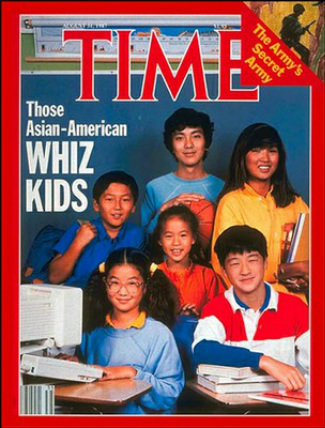 The model minority stereotype hurts Asian-Americans. The model minority stereotype hurts Asian-Americans. Tags: biology, culture, education, immigration/citizenship, race/ethnicity, asian-americans, model minority, stereotype, 00 to 05 mins Year: 2007 Length: 5:40 Access: YouTube Summary: Because Asian-Americans are often better off educationally and economically than whites and other minorities, many people believe in the racial stereotype that Asian-Americans are the model minority. This stereotype argues that Asians are naturally smarter or always fare better because of their strong “family values” and work ethic, with some arguing they are a “superminority” and have been “outwhiting the whites.” This CNN news clips analyzes and critiques the model minority stereotype. The video accurately notes there are no biological or genetic differences between Asians and any other so-called race (see video on race as a social construction). It cites psychological research from Hazel Markus (featured in the video) documenting how racial/cultural identity does shape some Asian-Americans' educational performance. The video further adds that the Asian-American classification is comprised of individuals from more than 12 countries, and that not all Asian immigrants or Asian-Americans performed equally well in education or economic success (a distinction that the stereotype ignores). However, the video fails to note the recent changes in Asian immigration that also affect educational and economic differences between Asians, whites, and other racial minorities. Specifically, many early Asian immigrants came to the US with relatively higher levels of education, English language skills, and occupational skills. More recent Asian immigrants tend to have less educational and economic resources, which again, is overlooked by the racial stereotype. Viewers are encouraged to consider: how does this seemingly positive racial stereotype actually hurt Asians (and other minorities)? As noted in this video interview with an Asian-American advocate, the stereotype prevents resources from being directed into the Asian-American community because "people are not aware of the critical needs" that exist. It also hurts other racial minorities (e.g., African-Americans) because the stereotype gets used to legitimate the opportunities of racial minorities in the US and to argue against the need for resources distributed to those communities. Submitted By: Paul Dean
4 Comments
Valerie Chepp
11/16/2014 07:36:48 am
This video pairs nicely with Bettina Chang's (2014) short article “The Problem With a Culture of Excellence,” which echoes some of the main themes raised in this video, and offers additional information on the limitations of such cultural essentialist perspectives.
Reply
Mandy
5/23/2023 01:58:56 am
Finally!!! I am the happiest woman to be called a mother soon. I am saying this because I am very grateful to Dr. Odunga for helping me with my relationship problems faced in my marriage due to the issues of infertility after 7 years of marriage. My husband and I have tried so many options for a successful fertility including IVF but it was futile. My husband's family have said different abusive words to me and my husband and he almost stopped loving me after many years of marriage without a child from me. It was a long time of sorrow for me and it affected me mentally. Dr. Odunga was introduced to me by a friend whom he helped and that was how I contacted Dr Odunga at [email protected] and within 2 days of contact, he did the spell and I successfully conceived after sleeping with my husband as he said. It was very surprising and overwhelming with joy and still unbelievable because I have been seeing testimonies of spell casters but never believed I would be helped by one. Dr. Odunga is indeed a great spell caster. Get in contact with this man to help you solve your problems at [email protected] or Whats App his phone number at +2348167159012
Reply
Manuel Franco
7/29/2023 02:25:58 am
I just want to say Thank You to everyone who supported me through the years. My name is Manuel Franco, New Berlin, Wisconsin. My story of how I won the Powerball lottery of $768.4M is a bit of a tale. I have been playing Powerball tickets for 6 years now since I turned 18. I bought my first ticket on my 18 birthday. I was feeling very lucky that day because I had contacted Dr. Odunga Michael to help me with the winning Powerball numbers. I really had that great great feeling that I looked at the camera wanting to wink at it. I only did a tiny part of it and trusted him. He gave me the numbers after I played a couple other tickets along with it for $10. I checked my ticket after the winnings came online and saw the numbers were correct including the Power play. I screamed for about 10 minutes because it felt like a dream. I had won $768.4M. You can check my winning testimony with the lottery officials just with my name search. Thank you Dr Odunga. Well, his email is [email protected] and you can also call or Whats-app him at +2348167159012 so you guys can contact him
Reply
mark hold
7/7/2024 04:16:53 pm
Herbal Penis Enlargement product is 100% guaranteed to Enlarge and get a better ERECTION, the reason why most people are finding it difficult to enlarge Penis is that they believe in medical reports, drugs and medical treatment which is not helpful for Penis Enlargement. Natural roots/herbs are the best remedies which can easily Enlarge your Penis permanently Contact Dr MOSES BUBA via Email: [email protected] or via WhatsApp: +2349060529305. for Natural root and herbal remedies put together to help Enlarge manhood and Erect healthily. I also learn that Dr MOSES BUBA also can cure other types of diseases, HEPATITIS B,DIABETICS,CANCER,HPV,LOW SPERM CAM, HIV/STDS, FIBROSIS LOST OF WEIGHT, BREAST ENLARGEMENT, HIPS and BUMS ENLARGEMENT etc .
Reply
Leave a Reply. |
Tags
All
.
Got any videos?
Are you finding useful videos for your classes? Do you have good videos you use in your own classes? Please consider submitting your videos here and helping us build our database!
|
 RSS Feed
RSS Feed
